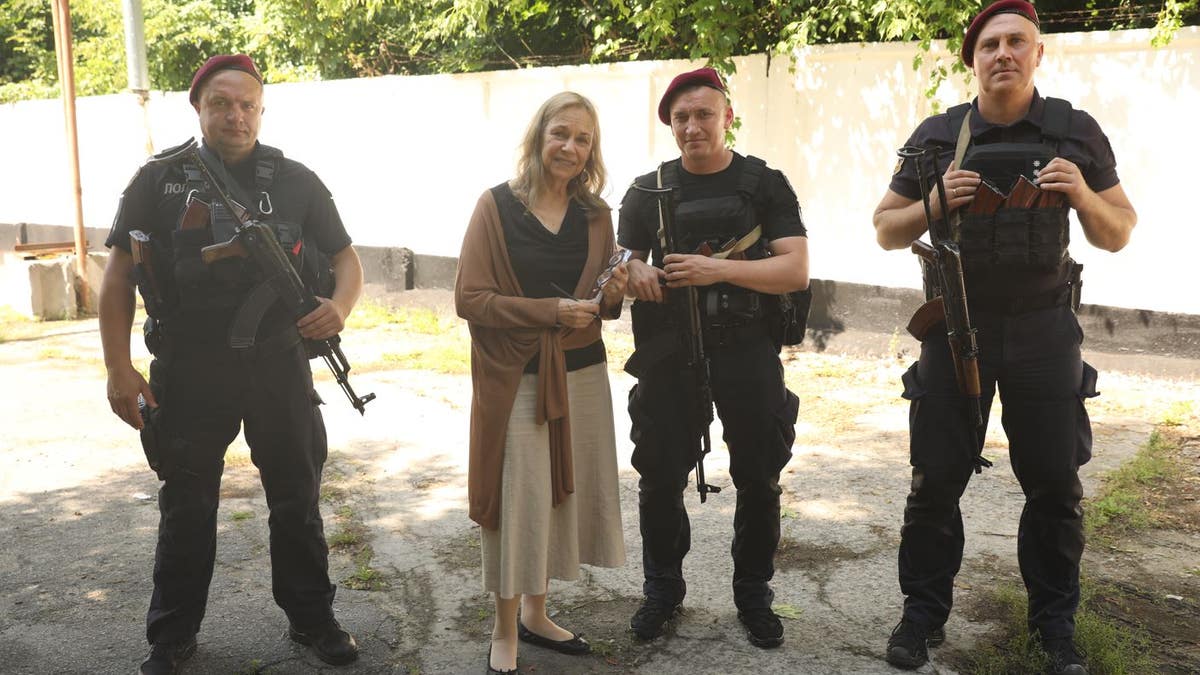Nuclear attack on Ukraine will result in 'catastrophic' consequences for Russia: Anders Fogh Rasmussen
Former NATO Secretary General Anders Fogh Rasmussen discusses if Ukraine's recent gains will escalate the war and push Putin to use nuclear weapons on 'America Reports.'
When the Russians invaded Ukraine, one of their first priorities was to bomb police stations and to empty prisons. When I visited Ukraine August with Stephen Komorek and other members of the ULET Working Group, which supports humanitarian aid and helping law enforcement in Ukraine, I found myself wondering why.
We asked General Andriy Nebytov of the Kyiv Regional Police about this tactic while visiting his Kyiv headquarters, and he explained, "A demoralized population is easier for the invader to control. Attacking the ability of the police to protect people was a carefully planned operation, and they knew what they were doing."
And what exactly was that? They were conducting a psychological operation (PSYOP) aimed at undermining the morale of the Ukrainian people. A PSYOP is a form of military operation that targets the emotional and mental state of the enemy. By degrading the police’s ability to serve and protect, the Russians sought to make the war-traumatized Ukrainians feel even less safe and destroy their will to resist.
However, despite the Russians’ systematic efforts to cripple the Ukrainian law enforcement — and with it, the spirit of their people — this PSYOP hasn’t worked. After spending a week in Ukraine as a guest of General Nebytov, I’m convinced Russian President Vladimir Putin came nowhere near demoralizing the Ukrainian people. Instead, I discovered how the Ukrainians have shown resistance in 100 small ways.

Mitzi Perdue in front of a bombed-out police station.
For the Ukrainians, this ordeal has lasted eight months thus far, and Russians have actively worked to intensify the trauma of their invasion. When, on top of the military violence, criminals can freely loot, rape, and join forces with the enemy, the Ukrainians’ distress multiplies and takes on many forms.
Even when towns are liberated, the invaders still work to undermine morale. As Nebytov told me, "The invaders left in a hurry, but even so, they took the time to boobytrap houses. A woman might open her refrigerator and end up detonating a mine." They even target children, going so far as to attach "tiny explosives to children's toys." He explained, "The mini-bombs don’t kill the children, but kids who played with these needed to have their hands amputated."
Pavel Maraev, a Ukrainian social worker, gave me a glimpse of the compounding stress his fellow Ukrainians are enduring. "People who are worried about being killed in a rocket attack, or who’ve lost loved ones, or whose home is now a pile of rubble — those people are traumatized," he said. Given this widespread tragedy, he stated, "We think as many as one-third of the population has some degree of PTSD."
Though the Russians have created unimaginable conditions, they have failed to destroy the Ukrainians’ will to resist.

Mitzi Perdue with her team of body guards in Ukraine.
Known for his work on the sociology of fear, Professor Frank Furedi offered insight into the Ukrainian’s unwavering morale. A day after leaving Ukraine, I met Furedi in England for lunch, where he told me a remarkable story about a Nazi death camp inmate.
During World War II, this prisoner was starving to death, yet he saved breadcrumbs to feed a wild bird that visited him in his cell each day. Years later, the former prisoner said that having the bird in his life fortified his will to live.
Furedi told me this story for a reason: I had shared with him how almost all of the women that I met in Ukraine, whether in stores, restaurants, public parks, offices or police stations, were wearing beautiful, bright nail polish.
The brave Ukrainian women, like the prisoner who fed the wild bird, will not let their spirits be crushed. By creating even small moments of reprieve, they are defeating the Russian attempts to demoralize their people.
CLICK HERE TO GET THE OPINION NEWSLETTER
While visiting a bombed-out police training center near the Belarus border, I found another example of this resiliency of spirit. Today, six months after the bombing, the smoky remains of the training center resemble a fire-and-brimstone hellscape. However, 20 yards from the building, there’s a rose garden with a dozen waist-high bushes in full bloom. Their scent wafts through the air. In the midst of death and destruction, the police still tend to this beautiful garden.
The Ukrainian people haven’t given into despair: instead, they have created moments of beauty. These small acts help maintain a semblance of normalcy in their lives and serve as a reminder of what they’re fighting for, and why they can never give up.
CLICK HERE TO GET THE FOX NEWS APP
No one knows how long this war is going to last, but I’m certain that Putin’s efforts to destroy law enforcement and, in doing so, demoralize the people of Ukraine, haven’t worked.
Like the starving prisoner who survived because of the beauty of a wild bird, the Ukrainian people show the tenacity of their spirit. With their beautiful painted nails and rose gardens, they resist Putin’s PSYOP in countless ways.












































